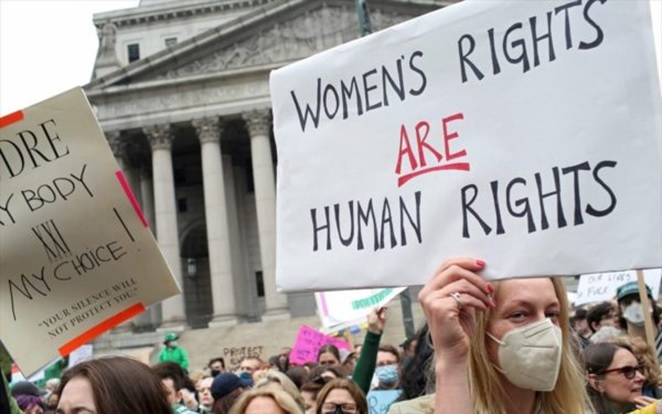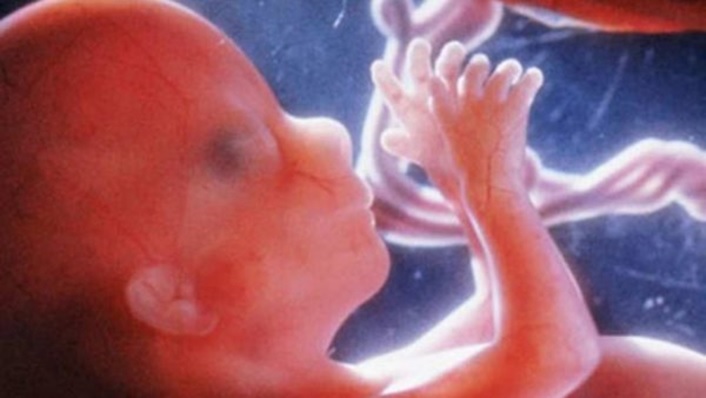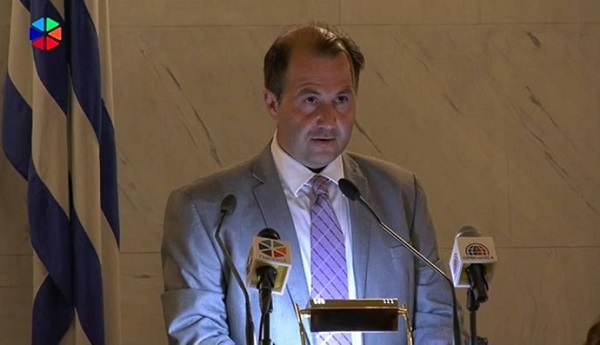Abortions, the Church and Low Birth Rate
16 September 2022The recent decision by the Supreme Court of the United States of America regarding returning abortion rights to the jurisdiction of individual states has re-opened intense discussions on the issue.
Dr Nikolaos Koios, Associate Professor at the University Ecclesiastical Academy of Thessaloniki and Director of the Pastoral Studies Program, spoke to ope.gr and Nikolaos Zaïmis about the scientific approach to the subject and the arguments concerning the position of Orthodox theology and anthropology, as well as how the Church regards the embryo.
Mr. Koios also referred to the training of priests with regard to the pastoral handling of abortions. He further mentioned the recent results of the 2021 census and the problem of the low birth rate which Greece is facing*.
- How should we see the issue of abortions from the point of view of public discussion and what is the scientific approach?
Abortion may be seen as the most ancient issue in bioethics. Of course, in the narrow sense it isn’t an issue for bioethics, since, in ancient times, none of the modern biomedical techniques were there to be applied. As a result it fell formally into the class of issues of medical ethics and of the relationship between physicians and their patients, as this is described in the Hippocratic Oath. We can examine it as a question of bioethics, however- a fundamental one, in fact- because from the moral discussion about abortion, there arose the issue of the status and value of the embryo. Some of the most important questions in bioethics depend directly on the definition of the status and value of the embryo. Among these issues are assisted reproduction, applied genetics and reproductive and therapeutic cloning.
- Is it a modern problem or do we find it in other times?
There are moral views, direct or indirect, as regards condoning or prohibiting abortions in texts dating from the 15th century B.C., such as Exodus, for example (21, 22-23), as well as from the 6th century B.C., such as the Hippocratic Oath. In Christian literature, we encounter views in the oldest Patristic texts, such as the letter To Diognetus, the Didache of the twelve apostles and the Epistle of Barnabas. From the fourth century, we have canons of the Church which explicitly forbid abortion and killing the embryo, equating this morally with murder.
- In modern times, does the issue of abortion arise as a natural development of human freedoms or is it being pushed by various movements?
The moral and also the legal prohibition on abortion continued into the modern era. It came to prominence when its removal became one of the demands of the feminist movement. The basic demand is the emancipation of women and their right for complete control and jurisdiction over their body and reproductive decision-making. With the demand for social and legal legitimization of abortion, the discussion regarding its morality has also been rekindled. Despite the reservations and objections which have been expressed, in today’s Western world abortions have been de-criminalized and are carried out legally in gynecological clinics. There are few differences in the legislation between countries and these are mostly concerned with technical details.

- The decriminalization of abortion brings the argument in its favor onto center stage. And we have two views on this. What are the fundamental positions taken by the supporters of both sides?
A variety of views have been expressed over the past decades from the academic perspective. The central arguments related to the issue of abortion, however, are based either on certain moral principles or they derive from particular, recognized rights. The view which considers abortion morally unacceptable is founded, essentially, on the following claims. First, that existence and the right to life for human beings begins either with the process of conception or that of fertilization. Secondly, that abortion represents the deliberate and unjust murder of the embryo, as well as an infringement on its right to life. Thirdly, and because of this, justice and the law should prevent unjust infringements on the right to life.
On the other hand, the view which condones abortion presents the following arguments. First that women have the right to decide what happens to their bodies. Secondly, abortion is nothing other than exercising this right. And thirdly, that justice and the law shouldn’t criminalize the exercise of the right in question.
In other words, the basic axes around which the thinking of both sides turns, are those of pro-life (on the part of those who are against abortion) and those of pro-choice (on the part of those who are in favor of free choice).
- What do you consider to be the basis of the reasoning behind these two positions?
What we have to make clear from the outset is that, at the basis of the whole reasoning lies the question: ‘What constitutes the human person?’. It can be seen that the common feature of all the above arguments, either in favor of or against abortion is that the definition of the person is made on the basis of psychological or social, rather than ontological categories. The person is judged and defined not on the basis of what it is, but on the basis of how it expresses itself. It might help here to look at the etymology of the word ‘person’. It derives from the Latin ‘persona’, which shares the same root as the verb ‘personare’, meaning ‘produce sounds/noise’, that is ‘I make my presence felt through the noise I produce’. In this way, the ‘person’, in the West, begins to exist from the moment it’s in a position to make its presence felt through its activities, thus drawing the attention of those around it.
On the other hand, in Greek Orthodox thought the person is an ontological classification rather than a social or psychological construct. What we should stress in the present context is that the psychological and social construct creates the foundation for ‘fluidity’ in its interpretation, whereas the ontological classification highlights the absolute nature of its existence. This distinction is fundamental to any understanding of the reason why many contemporary thinkers don’t see the elimination of embryos as a problem, since they in no way regard them as persons. This is not the case from the point of view of the Christian perspective as expressed through Orthodox theology.
- For Orthodox theology, what’s the position on the value-based approach to life?
As regards Orthodox theology, let me use the position of Metropolitan Nikolaos of Mesogaia and Lavreotiki. His Eminence holds that the axiological (value-based) view of embryonic life, which marks the beginning of the human person, can’t be so much the fruit of intellectual engagement or scientific research as the fruit of ethics. Therefore, on the level of ethics and anthropology (in the theological and philosophical sense), all the designations used for embryonic life tend towards one thing: that the moment when the egg and sperm unite and result in a unique genetic entity is not recognized as the start of life. When this definitive moment in the creation of the human person is downplayed, the door is gradually opened for experimental or other interventions on the embryo, not excluding those which will likely lead to its injury or even to its total elimination. Irrespective of the motives behind the action, the eradication of the life of the embryo is a non-reversible event.
- What stand does Orthodox theology take on the issue?
For a start, allow me to observe that the issue of abortions is the only one for which we have ordinances of prohibition in the Apostolic Fathers (Didache, To Diognetus, The Shepherd of Hermas, Epistle of Barnabas and so on ), as well as in the canons of the Church (Canon 24 of Saint Basil, Canon 91 of the Quinisext Synod, Canon 21 of the Synod of Ankara).
I can now address your question about the basic anthropological principles of the theology. These have two parameters. The first is that people are created in the image and likeness of God and the second is that each of us is a unified psychosomatic entity. Initially, with the first parameter, each person is unique, and also has unrivalled and unparalleled value, because they illustrate the Creator, the Triune God. Given that fertilization is the first moment when the uniqueness of a person becomes apparent, this moment is considered by Orthodox theology to be the beginning of existence. As the Synodal text of the Bioethics Committee of the Church of Greece expressly records: ‘The fertilized egg is not merely human but also a human being’.
As regards the unified psychosomatic entity, we should mention that the creation of the immortal soul takes place at precisely the same time as that of the perishable and mortal body. According to Saint Gregory of Nyssa, who condenses Christian anthropological teaching in his work ‘On the making of the human person’, there’s no soulless body and no bodiless soul. Based on this principle and on the Orthodox liturgical tradition, we’re brought to the conclusion that, were we to define the beginning of human life, it would coincide with the conception of the person at the moment of fertilization.

- Can you provide any examples from the liturgical life of the Church?
Apart from the Annunciation, which means the conception of Christ without seed, the Orthodox Church also celebrates the conception of the Mother of God as well as that of Saint John the Forerunner.
The manner in which the conception of the Mother of God is depicted is very much to the point. Her parents, Joachim and Anna, are portrayed in an embrace. So the life of the Mother of God in particular and, by extension, of every human person, begins with the first moment of the process of conception, with the coming together of a couple. This first moment includes fertilization.
It may be difficult for the reasoning of biology and medical science, and even for public opinion, to accept the theological criteria on this particular issue. The fertilized egg isn’t even called an embryo by many scientists and is considered a mere cell. Much less is it thought of as a human person.
- In the end, what is the embryo for the Church?
Orthodox theology doesn’t approach the embryo at clearly-defined stages. It doesn’t define what it is at any particular moment (cell, mass of cells and so on), but looks rather at its innate overall development. As regards its genetic prospects, the embryo is potentially a human being and a person from the moment of its conception. For Orthodox theology, there’s not a moment when these two notions are separate. For the Orthodox Church, the embryo is honored and protected as a human person from the moment of fertilization until the time of birth. Abortion is an act which is inadmissible.
- A practical issue and reasonable question for many people is: if a woman goes ahead with an abortion, that is, if she follows a path which is unacceptable to the Church, is there a pastoral way of dealing with it?
Is there proper pastoral training for priests in the event of such contingencies? I ask, because in Greece, the number of abortions has become a threat for the future… As we saw briefly above, the position of the Church as regards its view of human and, in this particular instance, embryonic life, has remained firmly as it was at the time of the Apostolic Fathers. The life of the embryo is just as sacred as that of any mature person, and extinguishing it is a sin which is inconsistent with the life of a baptized member of the Church. The pastoral approach to abortion is that it’s a serious sin which involves a great many spiritual, psychological and bodily parameters which a spiritual father/confessor is called upon to deal with. The inclusion of all these parameters in pastoral training- by each Metropolis in the old days and now by the centers of the Institute of Pastoral Training of the Archdiocese of Athens- makes it clear that, despite the Church’s steadfast theological view regarding the value of the life of the embryo over the centuries, the issue continues to test the reactions of the Church to this day.
This means that, although the Church is firm in its positions on abortion, quite a lot of changes can be observed in way people today view the issue. It may be that these changes are an impediment to communication and consensus on the matter. In our opinion, this is a huge issue and one deserving of extensive investigation in order to ascertain its true dimensions.

- Professor, in concluding our discussion I’d like a comment on the recent results of the census of 2021. There has been a drop in the number of residents amounting to 3.5%, as compared to 2011. The low birth rate is not an abstract issue, but one which strikes home with us. In your view, what is this due to and what can the Church do about it?
An interview’s always an opportunity to discuss reflections and I’d like to present some on this particular issue. In a society such as that of Greece, which is plagued with a low birth rate and in which, in the past decade, an accumulation of factors such as the economic crisis and the strained circumstances caused by the corona virus have had a negative impact, can there be a constructive dialogue linking love and the relations between the sexes, especially young people, with having children? Decades ago, these two things were already being viewed as separate.
Even among church-goers, young people often consign marriage and having a family to the distant future, sacrificing them to their studies or their professional advancement, which is becoming increasingly difficult. The result is that the age when people are most ready, physically and psychologically, to start a family, passes them by. By the time they reckon that circumstances have come together favorably, it’s not unusual for issues to arise regarding reduced fertility, psychological resilience and even chromosome anomalies in embryos.
To what extent is the Church prepared to open the dialogue, capitalizing on the enormous dynamic released by consumerism in recent years? Can it embrace the love of young people as a gift from God, and encourage them to express it creatively by showing them from experience that marriage and having children is growth and not the abdication of one’s personality.
Can the Church today cast off the cheerlessness with which moralistic circles have invested this gift from God and instead show it to be enjoyment of life and a cause for celebration? Can it really listen to the anxieties, the worries, the desires and the dreams of young people, become a true companion for them, and gain their respect?
I believe that it clearly can and wants to, though there may be a need for a re-assessment of pastoral priorities. The Institute for Pastoral Training of the Holy Archdiocese of Athens has already taken significant steps in this direction, though a great deal of work remains to be done.






